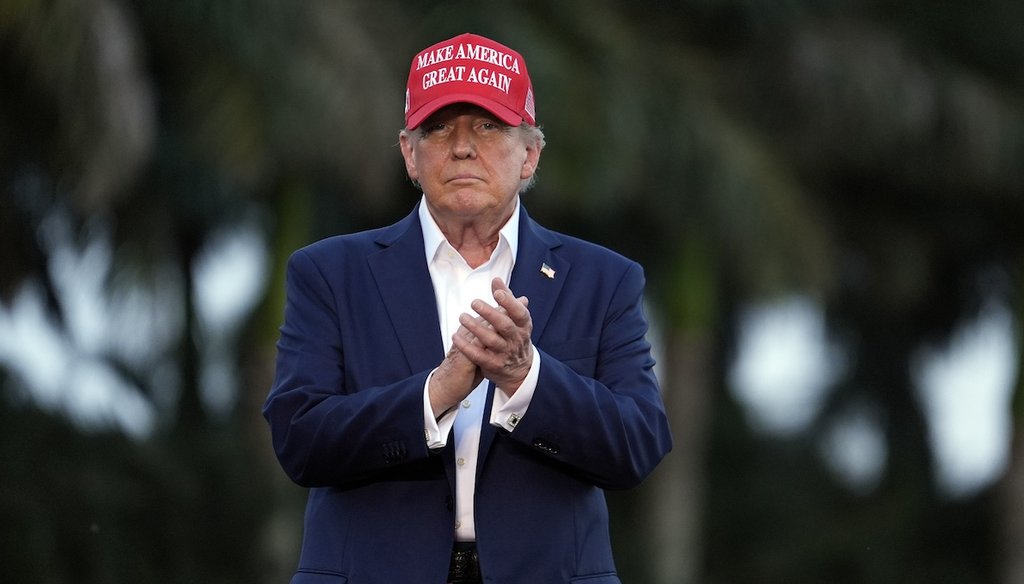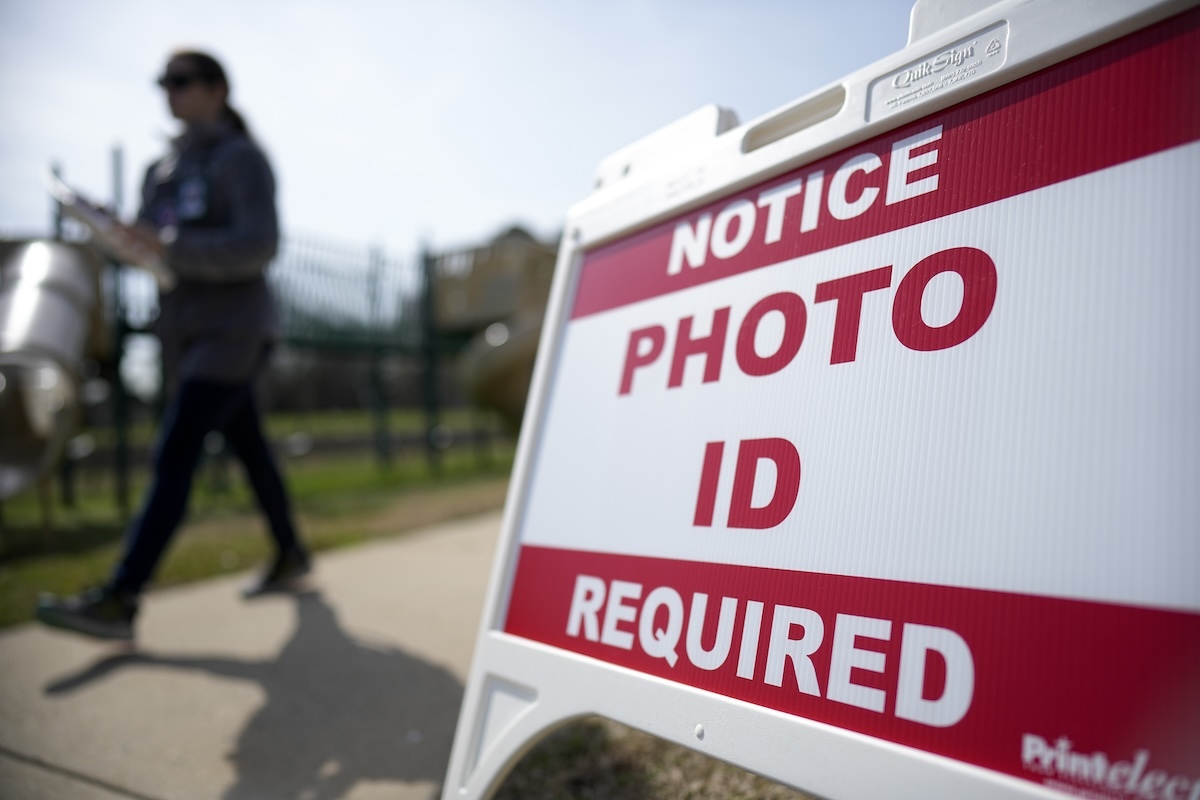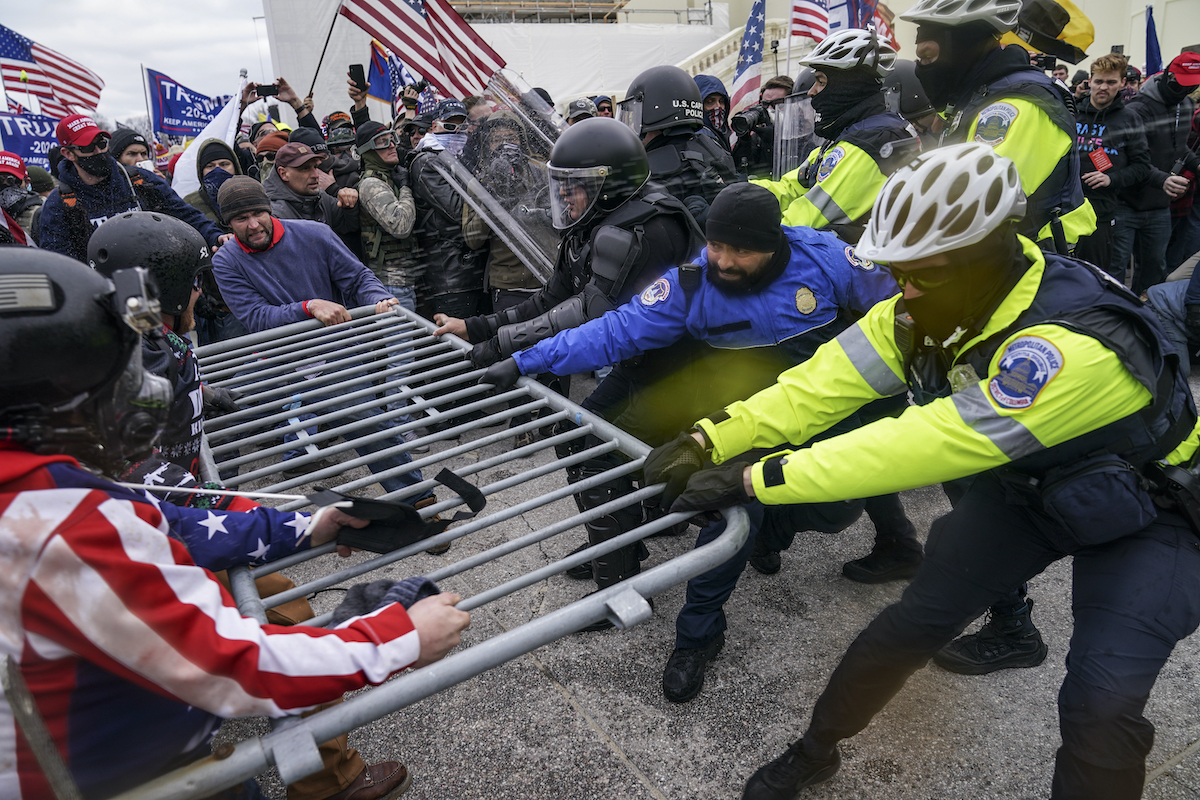Get PolitiFact in your inbox.

Former President Donald Trump arrives July 9, 2024, for a campaign rally in Doral, Fla. (AP)
As he’s campaigned to win back the White House, former President Donald Trump has made a lot of big promises.
Since its founding in 2007, one of PolitiFact's cornerstones has been tracking the progress, or lack thereof, sitting presidents have made on their campaign promises: We’ve done it for Barack Obama, Trump and Joe Biden. We include on our list only promises made by presidents and not by outside groups.
We found that Trump, during his presidency, kept 23% of 102 campaign promises. He enacted a Compromise for 22% of them and earned a Promise Broken on just more than half.
Since Trump announced his latest bid in November 2022, he’s made a flurry of new promises.
In all, we’ve identified more than 100 promises he’s made at rallies and other events, some of which build on his first term promises and some of which are new. Many of them are far-reaching:
-
Carry out the largest domestic deportation operation in American history.
-
Add a 10% tariff to all nondomestic goods sold in the U.S.
-
End the Russia-Ukraine war within 24 hours.
-
Fully pardon people convicted of storming the Capitol on Jan. 6, 2021.
-
Provide a "middle class, upper class, lower class, business class, big tax cut."
As he prepares to formally accept the Republican nomination, here are some high-profile issues on which Trump has been clearest about his plans for a second term.
Immigration
Most of Trump’s immigration promises are repeats of ones he made during his first term, many of which earned him a Promise Broken on PolitiFact’s promise tracker. (Overall, on immigration promises, Trump during his presidency had 10 Promise Broken ratings, two Promise Kept ratings and one Compromise.) To fulfill these promises in his second term, Trump would need congressional approval and funding, an immigration system overhaul and, in some cases, a new constitutional amendment.
Perhaps Trump’s most sweeping immigration promise would be to carry out the largest deportation operation in U.S. history. In his first term, he promised but failed to deport all immigrants living in the country illegally. Immigration experts have previously told us that mass deportation efforts would likely not work because of concerns over resources and constitutionality.
Trump has also committed to finish building the border wall on the U.S. southern border. During his first term, Trump built around 450 miles of border barriers along the southern border — many of them replaced old and dilapidated barriers. The former president faced hurdles to secure the appropriations required, and, despite his promise at the time, Mexico did not pay for it.
And echoing his 2016 promise, Trump has again said he would prevent children born in the U.S. to parents here illegally from automatically becoming U.S. citizens. But legal experts told us any attempt at this would prompt a court battle and could require a constitutional amendment.
RELATED: How viable is Trump’s 2024 immigration plan?
Economy
Trump’s top economic promises also reiterate themes he pursued during his previous term in office.
He would pursue an aggressive trade policy, this time including a 10% tariff on foreign goods. Critics have said this would spike inflation after Trump has hammered Biden over elevated prices. Trump said he would also prevent U.S. investments in Chinese companies; Trump has often singled out China as an economic adversary.
Trump has called for a tax cut that helps all economic classes; critics have said his 2017 tax law sent disproportionate benefits to the wealthiest Americans. He also backed ending taxation on tips.
Trump has also promised to lower the costs of cars and housing and impose a 25% tariff on manufacturers that produce products in Mexico.
Foreign policy and military
On foreign policy, Trump seeks to pivot away from approaches where he believes Biden has failed, though his promises often lack detail.
On Russia, Trump has pledged to end that country’s war against Ukraine in 24 hours, which Ukrainians fear, and U.S. officials and policy experts agree, could lead to Russia taking chunks of the country it holds. Even a Russian official has said on the record that 24 hours is not a feasible deadline.
Trump also promises to limit Chinese ownership of U.S. vital infrastructure and to construct an Iron Dome-like missile defense system for the U.S. Experts have told PolitiFact that Iron Dome is designed to combat threats such as those faced by Israel, a small nation hemmed in by enemies, and because the U.S. is larger and doesn’t have the same threats from its direct neighbors, the technology is less useful here.
He told Time magazine in April that he would get Russia to release U.S. journalist Evan Gerskovich, without indicating what concessions he would make to do it.
Health and human services
Trump has vowed to cut federal programs, including abolishing the Education Department, but has promised to spare Social Security and Medicare. However, without changes such as raising the age for receiving Social Security, the programs are set to run out of money in about 10 to 15 years.
During his June 27 debate with Biden, Trump said he would not block the abortion drug mifepristone, which some abortion opponents have sought to curb.
Trump has also promised to cap the cost of prescription drugs at the same level other countries pay. Experts have told PolitiFact that this is possible, but would likely involve a structural overhaul of the U.S. health care system, making it difficult.
Trump has also promised to withdraw from the World Health Organization.
Supporters of former President Donald Trump try to break through a police barrier, Jan. 6, 2021, at the Capitol in Washington. (AP)
Crime and guns
Trump’s promises on crime and guns align with his past positions. He would impose the death penalty for selling drugs, increase punishments for juvenile offenders, increase legal protections for police officers and expand concealed carry rights for gun owners.
Some of his promises would face obstacles because states set their own laws on policing, and because sentencing laws and police budgets are largely set locally.
Meanwhile, Trump has promised to pardon people convicted of storming the Capitol on Jan. 6, 2021. He later said he would "consider" doing it rather than committing fully.
A Super Tuesday voter walks past a sign requiring a photo ID at a polling location March 5, 2024, in Mount Holly, N.C. (AP)
Elections
Trump’s election-related promises draw heavily on falsehoods he has spread about 2020 voter fraud. His proposed changes would massively alter how U.S. elections operate, but in many cases states have jurisdiction over many of these proposals, not the federal government.
His promises include demanding voters to present identification — even though the majority of states already have voter ID laws — and requiring proof of citizenship at the polls. Trump has promised in the future "one-day voting" which would presumably remove in person early voting and voting by mail but he has told Republicans this cycle they can vote by mail.
Education
Trump’s education agenda includes widening school choice and encouraging homeschooling.
He would discourage school vaccine mandates and expand prayer in schools. Because of federalism, states and localities have more sway over K-12 education policy, limiting Trump’s potential reach on some of these efforts.
LGBTQ+ issues
Trump has said he’d work to stem broadening LGBTQ+ rights. He has said he would sign legislation recognizing only two genders, assigned at birth, end federal programs that "promote the concept of sex and gender transition," and sign legislation outlawing gender-related surgery for minors.
He would also sign legislation banning trans women from participating in women's sports and reinstate the transgender ban in the military.
RELATED: How Trump, Biden compare on LGBTQ+ issues
Bureaucracy
Trump has targeted what he and his allies call "the deep state," but which his critics defend as the apolitical civil service. Some of Trump’s promises to tighten rules on lobbying and on the government-corporate revolving door could gain bipartisan support, but others would enable the White House to upend more than a century of civil service rules and potentially install allies throughout the federal government.
He would empower the president to remove "rogue bureaucrats," revoke federal initiatives on diversity, equity and inclusion and require federal employees to pass a civil service test. Trump would also have the federal government take over the management of Washington, D.C., and cut off federal funding for NPR.
Climate change, energy and transportation
Trump has expressed skepticism about climate change and renewable energy, including electric vehicles.
His promises largely reflect that worldview.
He would eliminate mandates for electric cars, leave the Paris climate accord (again), approve new liquefied natural gas terminals and end offshore wind energy development.
Technology
Trump has sparred with social media platforms, including Facebook and pre-Elon Musk Twitter, over efforts to label or otherwise stigmatize factually inaccurate posts. (He has been more solicitous toward TikTok, after initially coming out hard against the Chinese-owned company.)
Trump’s promises about social media include requiring social media platforms to have an appeals process when accounts are banned and requiring court orders to take down online content. Doing so would likely require the enactment of new legislation, which is always challenging, especially when it targets an industry sector as influential as Silicon Valley
Homelessness
Trump has pledged to crack down on homeless Americans, promising to ban "urban camping," and create "tent cities" where the homeless can be relocated. Trump’s vision is in tune with a Supreme Court decision in June, which said that cities can punish homeless people for sleeping in public spaces.
PolitiFact Senior Correspondent Amy Sherman and Staff Writers Grace Abels, Samantha Putterman and Maria Ramirez Uribe contributed to this report.
Our Sources
See links for sources.







































